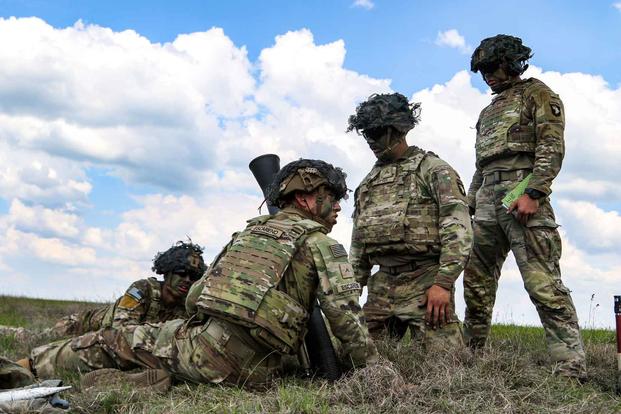Only 32% of military families would still recommend military service, citing poor job opportunities for spouses, poor mental and physical health care services, and housing concerns, among other issues, according to a survey conducted by Blue Star Families.
The likelihood of active-duty families recommending military service dropped from 55% in 2016 to just 32% in 2023, according to the survey. Active-duty troops, as well as National Guard and reserve family members, all cited time spent away from their families as their top issue with the military.
The annual survey had more than 7,400 responses between May and July 2023 and is the "most comprehensive" survey of its kind, open to service members, veterans, military families and members of the Guard and reserves, according to the organization's website. It is conducted by Blue Star Families in conjunction with Syracuse University's Institute for Veterans and Military Families.
Blue Star Families is a resource and advocacy organization for military-affiliated communities, founded by a group of military spouses in 2009.
Other key findings of the survey showed that military members and families were greatly concerned with pay, spousal employment, access to affordable child care and housing options, echoing concerns raised by top military officials earlier this year.
Nearly half of respondents were concerned with spousal employment, 38% with time spent away from family, 37% with pay, and 36% and 33% concerned about housing and children's education, respectively.
The senior enlisted leaders of all of the military branches appeared before Congress in January to discuss quality-of-life issues for troops, similarly citing pay and housing issues as the top two concerns.
"A couple of these problems are so big that if we don't start taking immediate action on them now, we're going to miss the curve in the future," Master Chief Petty Officer of the Navy James Honea said at the House hearing held Jan. 31.
According to the Blue Star survey, 73% of active duty-affiliated respondents were paying more than $200 a month out-of-pocket for civilian housing options, and 48% of active-duty families noted they had financial stress stemming from general housing costs.
Base housing has been a topic of serious debate for lawmakers and military leadership, as reports of mold, shoddy electrical systems and leaky roofs have continued to spring up as consistently under-addressed concerns.
In recent years, lawmakers have proposed overhauling the military pay chart to give junior enlisted service members a significant pay boost in addition to the annual across-the-board raise for all troops. Lawmakers have also advanced new, targeted bonuses and allowances to make military service more appealing amid the recruitment crisis -- only the Marine Corps and Space Force, the two smallest branches of the Defense Department, met their 2023 recruiting quotas.
But in most cases, civilian defense officials and other administration officials have rebuffed those proposals, arguing they are premature amid an ongoing comprehensive review of military pay that is expected to be done by early 2025.
The findings within the Blue Star Families survey heavily support the suggestion that service members cannot keep up with increasing inflation, food, housing and health care costs. Of its active-duty respondents, one in six reported food insecurity, the survey showed. Among enlisted members, reported food insecurity was even higher, suffered by one in four families, according to the survey.
"We are still in credit card debt from our PCS," one active-duty Army spouse wrote in the survey. "Cost of living is rising. My children are young and need balanced meals. I spend my entire civilian paycheck on child care. We buy cheap food and skip where we can."
In December, the Pentagon made its first announcement of a plan to address food security for troops, but said that more data was needed. Pay increases and new allowances have been floated by Congress, and improved on-base food options are "something the services are leaned into very heavily," a senior defense official told Military.com in December.
"They have been doing a lot of work trying to make sure that the way service members -- the single service members who live on the installations, in the barracks -- have access to food," the official said.
While the results of the survey may raise the alarm for leaders, it should be noted that it is not a scientific study. Its findings, which were the result of multiple-choice and open-ended questions, are not necessarily reflective of demographics within the military as a whole.
The Defense Department launched a similar survey, the 2023 Survey on the Strengths and Challenges of Military Relationships, last April. Its results have yet to be publicly shared.
Related: Navy Survey Shows Continued Problems with Stress, Burnout Among Sailors, But Progress on Culture













